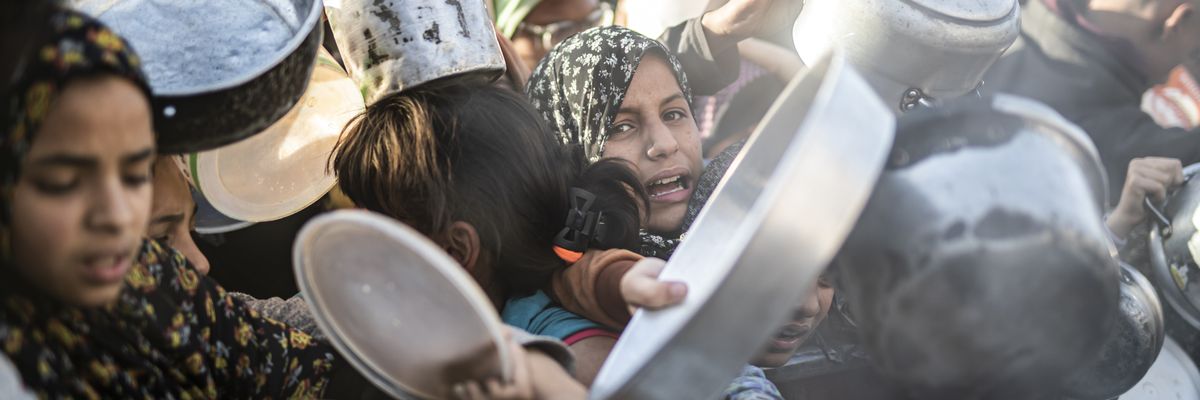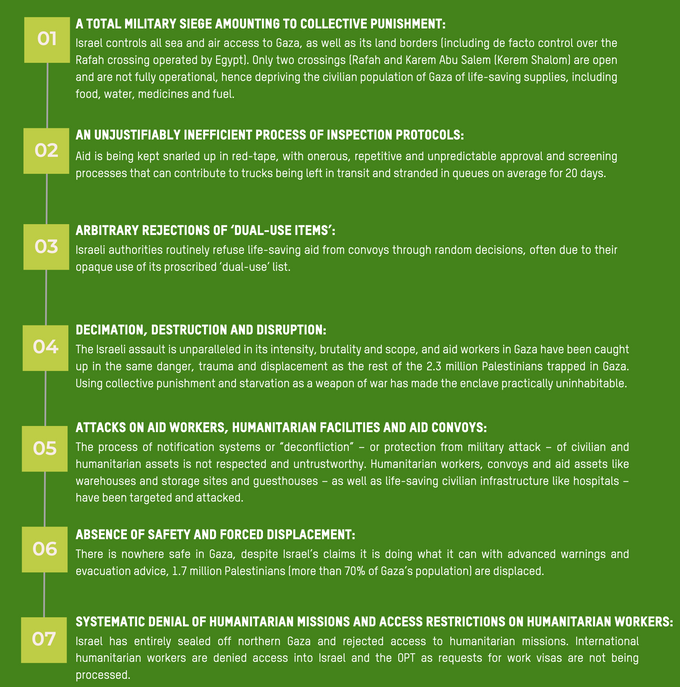Oxfam Says Israel ‘Actively Hindering’ Aid to Gaza in Violation of ICJ Order
Original article by JAKE JOHNSON republished from Common Dreams under Creative Commons (CC BY-NC-ND 3.0).

“There is an indisputable, man-made, intentional deprivation of aid that continues to suck the life out of any and all humanitarian operations, including our own,” said one campaigner.
The Israeli government is intentionally restricting the flow of humanitarian aid to the Gaza Strip by subjecting shipments to a prolonged and dysfunctional inspection process, arbitrarily rejecting items, attacking aid convoys, and limiting the number of crossings through which deliveries can pass, Oxfam International said in a report published late Sunday.
The report, titled Inflicting Unprecedented Suffering and Destruction, argues that Israel’s continued obstruction of humanitarian aid is a direct violation of both international humanitarian law (IHL) and a January order from the International Court of Justice (ICJ), which ruled the Israeli government is “plausibly” committing genocide in Gaza and must ensure that assistance reaches desperate Gazans.
Oxfam said Sunday that “humanitarian access in the Gaza Strip has effectively worsened” since the ICJ handed down its interim order nearly two months ago, and conditions on the ground in the Palestinian territory have deteriorated rapidly. New data from the Integrated Food Security Phase Classification (IPC) shows that Gaza’s “entire population” is facing “high levels of acute food insecurity” and 1.1 million people are experiencing “catastrophic” hunger—a figure that one expert called “unprecedented.”
“The ICJ order should have shocked Israeli leaders to change course, but since then conditions in Gaza have actually worsened,” said Sally Abi Khalil, Oxfam’s Middle East and North Africa director. “The fact that other governments have not challenged Israel hard enough, but instead turned to less effective methods like airdrops and maritime corridors is a huge red flag, signaling that Israel continues to deny the full potential of better ways to deliver more aid.”
“Israeli authorities are not only failing to facilitate the international aid effort but are actively hindering it,” Abi Khalil added. “We believe that Israel is failing to take all measures within its power to prevent genocide.”
In its new report, Oxfam outlines seven ways in which the Israeli government is impeding humanitarian aid shipments and exacerbating one of the worst humanitarian catastrophes in modern history:

In February—the first full month after the ICJ’s order—Israel allowed just 2,874 aid trucks to enter the Gaza Strip, a 44% decline compared to the previous month, according to Oxfam.
The group said Israeli authorities “have rejected a warehouse full of international aid including oxygen, incubators, and Oxfam water and sanitation gear, all of which is now stockpiled at Al Arish just 40 kilometers away from the border of 2.3 million desperate Palestinians in Gaza.”
Israel’s military, which is armed by the U.S. and other major countries that are legally obligated to prevent genocide, has also blocked humanitarian staff from entering Gaza, adding “pressure and workload” to already overwhelmed aid efforts, Oxfam said.
Celine Maayeh, advocacy and research officer at Juzoor for Health and Social Development—an Oxfam partner organization—said Sunday that “there’s been an alarming increase in cases of malnutrition among children in the last month, and yet the only food the team is able to find to feed people living in 45 shelters is some vegetables.”
“There is an indisputable, man-made, intentional deprivation of aid that continues to suck the life out of any and all humanitarian operations, including our own,” said Maayeh.
“If a famine is declared, it will already be too late for too many people—children are famine’s first victims and are already dying in Gaza because of malnutrition.”
Oxfam’s findings are consistent with those of other aid organizations and lawmakers who have visited the region in recent weeks.
In January, U.S. Sens. Jeff Merkley (D-Ore.) and Chris Van Hollen (D-Md.) told reporters that they witnessed “miles of backed-up trucks” stuck at border crossings as Gazans nearby struggled to survive, eating grass and drinking contaminated water.
The senators said they saw one warehouse full of items that Israeli authorities rejected in their inspection process, including oxygen cylinders and medical kits used for delivering babies.
Van Hollen said the warehouse was “a testament to the arbitrariness” of Israel’s inspections.
Oxfam argued Sunday that the “only meaningful solution” to Gaza’s intensifying humanitarian emergency is “an immediate, permanent, and unconditional cease-fire.”
“Even the trickle of aid that a humanitarian response could provide under the current circumstances is being further obstructed by Israel’s policies and practices, inflicting suffering on millions of Palestinians who are living under Israeli bombardment without access to food, clean water, and medical care,” the group said.
Xavier Joubert, country director for Save the Children in the occupied Palestinian territory, echoed Oxfam’s call for a cease-fire and warned in response to the new IPC figures that “we have a clear timeframe to stave off famine, and it demands urgency.”
“If a famine is declared, it will already be too late for too many people—children are famine’s first victims and are already dying in Gaza because of malnutrition,” said Joubert. “Every minute counts for them. It should be on the collective conscience of Israeli authorities and the international community that every day without an immediate, definitive cease-fire and unfettered access for and to humanitarian aid is another catastrophic day of starvation and suffering, another step towards famine, and another death knell for Gaza’s children.”
Original article by JAKE JOHNSON republished from Common Dreams under Creative Commons (CC BY-NC-ND 3.0).




